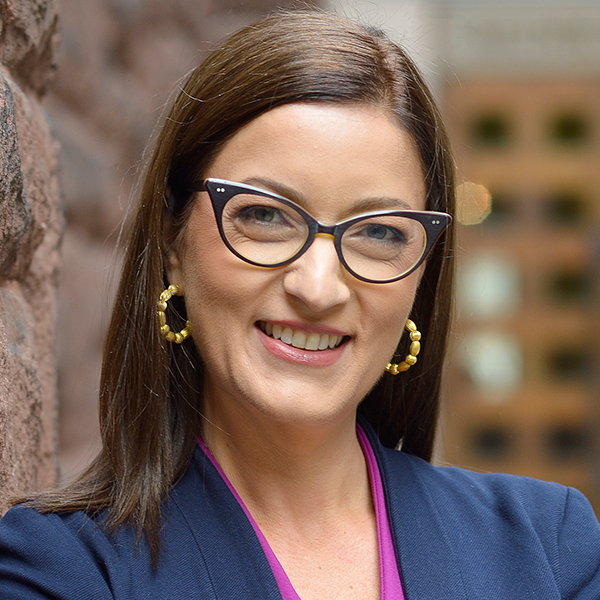Breadcrumbs
- Home
- Community & Partnerships
- Office of Health System Partnerships
- National/Provincial team
National/Provincial team

Dr. Danielle Martin
Chair, Department of Family and Community Medicine
Dr. Danielle Martin is Chair of the Department of Family and Community Medicine (DFCM), University of Toronto. DFCM is the largest academic department of family medicine in the world and home to the World Health Organization (WHO) Collaborating Centre on Family Medicine and Primary Care. Dr. Martin is grounded in her clinical primary care expertise. She is an active family physician whose clinical work has ranged from comprehensive family medicine in rural and remote communities to maternity care. She is a dedicated educator, mentor and role model to learners aspiring to enter medicine and health care leadership.
Dr. Martin is a respected leader in Canadian medicine and well-recognized media spokesperson, regularly named on lists such as Medical Post’s Power List. Her 2014 presentation to a United States Senate Subcommittee about the Canadian health care system has been viewed by over 30 million people across the globe. Dr. Martin spent eight years as a senior hospital executive, most recently as Executive Vice President and Lead Medical Executive at Women’s College Hospital (WCH), where she was also medical lead of the hospital’s COVID-19 pandemic response. At WCH, she led the establishment of Women’s Virtual, Canada’s first virtual hospital. The recipient of many awards and accolades, in 2019 Dr. Martin became the youngest physician ever to receive the F.N.G. Starr Award, the highest honour available to Canadian Medical Association members.

Dr. Tara Kiran
Vice-Chair, Quality and Innovation
Fidani Chair in Improvement and Innovation
Department of Family and Community Medicine
Tara Kiran is the Fidani Chair in Improvement and Innovation and Vice-Chair Quality and Innovation at the Department of Family and Community Medicine, University of Toronto. Much of her research has focused on evaluating the impact of Ontario’s primary care reforms on quality of care. More recently, she is focusing her efforts on quality improvement research including initiatives to improve patient experience including access to care, increase cancer screening rates, treat Hepatitis C, reduce high-risk opioid prescribing, measure and reduce care disparities, and support physicians to learn from data. She practices family medicine at the St. Michael’s Hospital Academic Family Health Team where she led the quality improvement program from 2011 to 2018. She is a Scientist in the Centre for Urban Health Solutions at St. Michael’s Hospital and an Adjunct Scientist at ICES.

Dr. Noah Ivers
Scientific Lead
Dr. Noah Ivers is a family physician at Women's College Hospital, scientist at Women’s College Research Institute, and innovation fellow at the Women's College Institute for Health System Solutions. He is also an Associate Professor in the Department of Family and Community Medicine and at the Institute for Health Policy, Management and Evaluation at the University of Toronto. He holds a Canada Research Chair in the Implementation of Evidence Based Practice. Noah's research focuses on the use of data to drive evidence-based, patient-centred improvements in healthcare. He has conducted multiple pragmatic randomized trials, systematic reviews, and qualitative work on health services and quality improvement interventions.

Ali N. Damji, BHSc, MD, MSc., CCFP
Primary Care Collaborative Partnership Lead
Focus: Support the OHSP in its strategic goal to strengthen our relationship with the Ontario College of Family Physician (OCFP), the Canadian Medical Association (CMA) and/or other professional groups focused on improving primary care while supporting physician well-being.
Dr. Ali Damji is a family physician and addiction medicine physician from Mississauga, Canada. He works clinically at the Credit Valley Family Health Team and the Halton & Mississauga Rapid Access to Addiction Medicine Clinic. He is the Quality Improvement Program Director for the Credit Valley Family Medicine Teaching Unit and regularly teaches quality improvement to faculty, other health professionals, residents, and medical students locally and internationally at the Aga Khan University Hospital in Nairobi, Kenya, and the Makerere University in Uganda. He completed his medical school, family medicine residency, and Master of Science in System Leadership and Innovation at the University of Toronto.
He is Division Head of Primary Care at Trillium Health Partners where he leads approximately 300 family physicians. He is an Assistant Professor in the Department of Family & Community Medicine at the University of Toronto and an Investigator with the Institute for Better Health. He is also actively involved in leadership, serving as a member of the Board of Directors of the Centre for Effective Practice, a member of the Policy & Advocacy Committee of the Ontario Medical Association Section of General & Family Practice Executive, and Honorary Secretary-Treasurer for the Foundation for Advancing Family Medicine.
He is the recipient of numerous leadership and teaching awards including most recently the University of Toronto MD Program Teaching Award of Excellence, Department of Family & Community Medicine Mentorship Award for Undergraduate Medical Students, The COVID Hero Award from the City of Mississauga, multiple Quality and Innovation Awards from Trillium Health Partners and the College of Family Physicians of Canada Award of Excellence.

Jennifer Shuldiner, PhD
Evaluation Faculty Lead
Focus: Co-lead the evaluation of the Peers for Joy initiative which integrates DFCM team members from wellness, quality and research. Guide the qualitative evaluation methodology for the interprofessional primary care teams.
Dr. Shuldiner is a scientist at Women's College Hospital and an assistant professor at the Institute of Health Policy and Management and Evaluation at the University of Toronto. She also holds an AMS Healthcare Fellowship in Compassion and Artificial Intelligence and Digital Health. Her interests and methodological expertise lie in improving primary care through thoughtful design and rigorous evaluation to enable real-time improvements. She integrates a human-centered design approach, behavioural science, implementation science, and mixed methods to design, implement, and evaluate programs aimed at improving patient outcomes and experiences. Jennifer is passionate about the co-production of research to facilitate the development and implementation of effective, patient-centered, and provider-centered innovations.

Jessica Bytautas, PhD
Academic Writing and Knowledge Translation Lead
Dr. Jessica Bytautas is an Assistant Professor, Teaching Stream in the Department of Health & Society at the University of Toronto Scarborough. She teaches across the areas of health policy and systems, health humanities, aging and society, and critical qualitative health research. Dr. Bytautas’s program of research examines how community-based and volunteer-led approaches to palliative care for structurally marginalized populations reimagine care beyond hierarchical systems through relational and creative practices. At OHSP, she contributes to policy-relevant knowledge dissemination through evidence syntheses that bridge academic, community, and health system audiences. Supported by a SSHRC Canada Graduate Scholarship, Dr. Bytautas earned her PhD in social and behavioural health sciences from the Dalla Lana School of Public Health at the University of Toronto. She also holds an MSc in health services research from the Institute of Health Policy, Management and Evaluation at the University of Toronto and a BA(Hons) in philosophy from McMaster University.

Sydney Pearce, PhD
Postdoctoral Fellow
Dr. Pearce’s work focuses on interprofessional primary care teams across a range of topics, including its impact on capacity, managing administrative burden, and implementation evaluation. She completed her PhD in epidemiology and One Health and is a mixed-methods researcher who aims to center equity and community voices in her work. She has a particular interest in knowledge synthesis methods (e.g., realist reviews, systematic reviews), knowledge translation, and implementation as mechanisms through which research moves on to facilitate real-world impact. She has received various academic excellence and knowledge translation awards during her research career and continues to learn in her current role which encompasses many projects with health system policy relevance, from local to international scales. In the future, she hopes to continue to conduct policy-relevant research and work closely with policymakers/health system actors to promote equitable, integrated, and effective health systems solutions.
